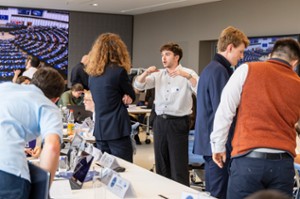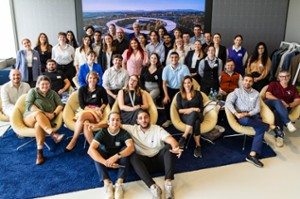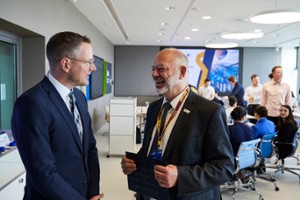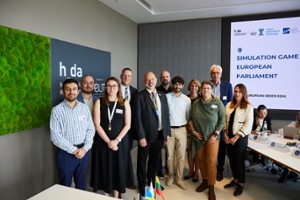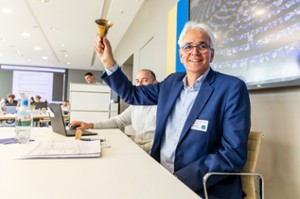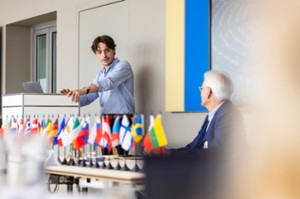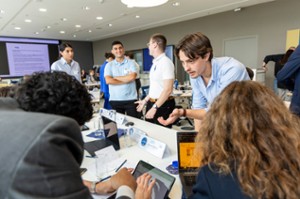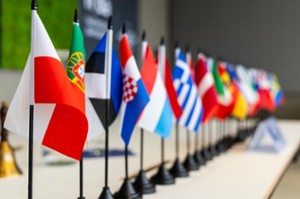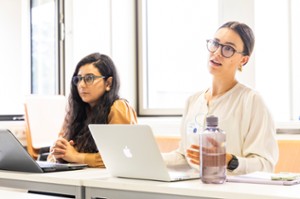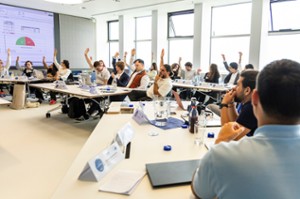- Home
“A peace and democracy project” - Students of the European University of Technology (EUT+) debate the “Green Deal” as members of the European Parliament in a simulation game
Published on June 11, 2025
–
Updated on July 24, 2025
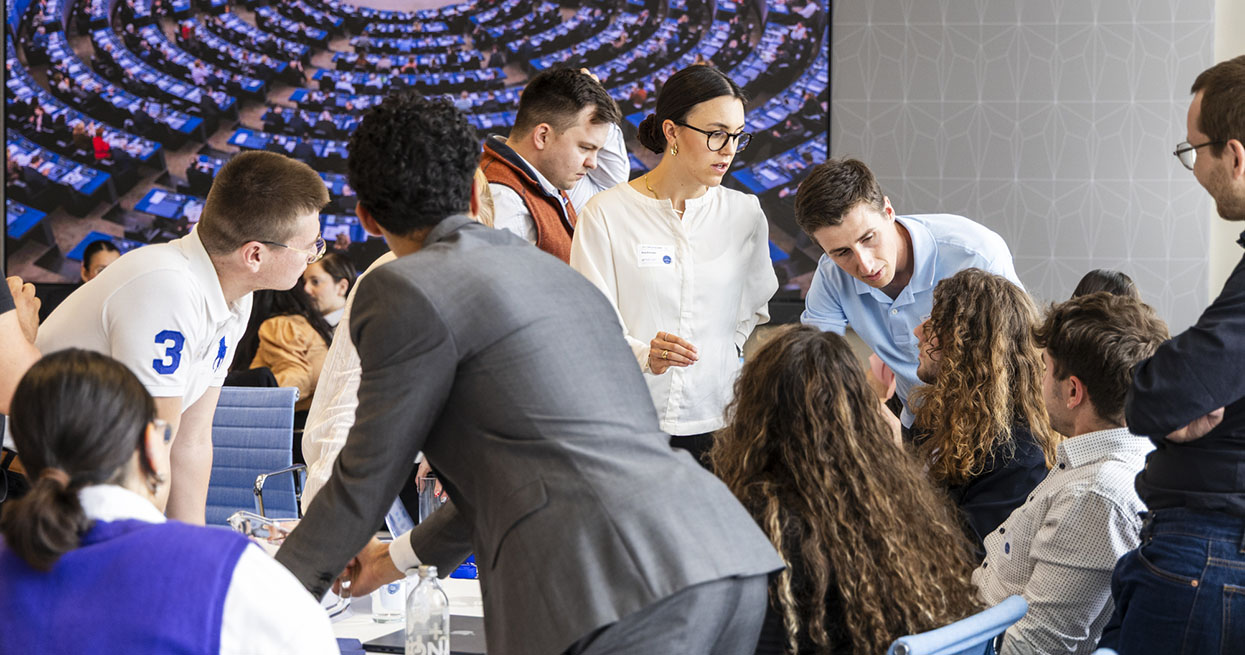
Dates
on the June 10, 2025
Europe has come to a crossroads and is currently experiencing the biggest crisis since the end of World War 2. Anti-democratic parties are gaining popularity, and politically motivated crimes are on the rise. In times like these, teaching people about democracy is particularly important. The “European University of Technology” (EUt+), which convened on the campus of Darmstadt University of Applied Sciences (h_da) from 3 to 6 June for a working meeting, is also staying abreast of this development: on one of the days, almost 40 students from France, Cyprus and Germany debated the European “Green Deal” as MEPs in a simulation game.
The sky is a mix of white and blue, just like the furniture in the recently refurbished Senate Hall at Darmstadt University of Applied Sciences (h_da), with its impressive view of the Frankfurt skyline. A buzz of different languages can be heard from within on this Thursday morning – and the project “Become a Member of the European Parliament for a Day!” as part of the European University of Technology’s “Darmstadt Week” on h_da’s campus is just as international. “Our Senate Hall is a real eye-catcher, everything is brand new,” says Arnd Steinmetz, President of h_da, in his welcome address to the students from France, Cyprus and Darmstadt, “and it’s at your disposal!” For the “EUt+ Simulation Game”, the room is transformed for a day into the plenary chamber of the European Parliament, with a lectern, a table with the 27 flags of the EU member states, tables for the six political groups, chairs for visitors and large photographs of the European Parliament in Strasbourg on the wall.
After a long day, they are not exhausted at all, but are looking forward to the finale at the Darmstadt Schlossgrabenfest after a very close vote on a resolution on energy – in the end, one student vote is decisive, and weighted according to the votes in the EP, the Conservative motion receives 303 votes in favour and 281 against. Having attended the online programme “Become a Member of the European Parliament for a Day!” over the course of a semester and preparing for the debate at h_da for a week, they had earned the right to celebrate. They were selected from a large group of applicants from all the faculties at the three participating partner universities, with the result that prospective lawyers were present alongside engineers and future business psychologists.
Business Psychology is Alexander’s degree subject. He stands at the lectern on behalf of the “Renew Europe” party and announces: “The time to act is now!” It’s cool, he says, to slip into the role of a politician, to adopt and represent ideas – especially when they are not your own. The extensive preparation proved worthwhile, he says: in sessions over two days they practised how to give a presentation, use rhetorical devices, act confidently and, above all, “to listen and want to understand what the other person is saying.”
“Abandoning their own values” is certainly what the six members of the “Patriots for Europe” party – a far-right political group in the European Parliament (meanwhile the third largest) – were obliged to do. They are calling for a revision of the Green Deal, a demand that Nathan from Troyes had to defend on the Thursday. He played his role to perfection, provoked the parliamentarians with far-right remarks and was advised to become an actor rather than a politician. Nathan grins and takes it all in his stride. He is studying Computer Engineering in Troyes – “the focus there is not on politics,” he says, which is what makes the project especially enriching for him.
Extensive preparation prior to the “first edition”
It was students at the partner university in Troyes who had the idea for the event, “and we were all inspired by it,” says Steinmetz. Admittedly, it called for extensive preparation, something to which not only co-initiator Dorina Kaiser from h_da can attest. But that’s how it is with a “first edition”. The organisers, Professor Anja Hentschel and Professor Andreas Haidvogl from Social and Cultural Sciences (SuK), a cross-disciplinary programme at h_da, were also pleased when the event reached its peak with the simulation game – and that the preparation in the shape of online seminars since March 2024 had been worthwhile.Heated discussions and lots of applause
“The standard of the pitches was amazing,” says Haidvogl, praising the short, seven-minute presentations on the topic of energy, which – like the entire event – were held in fluent English. Who could disagree with that? What the students from the three EUt+ universities offered on that day, how competently they debated, argued and presented themselves, pleased not only the lecturers. Applause was just as much a part of it as heckling and heated discussions during the breaks. Klaus Pendl, a lecturer with many years’ experience at the European Commission in Brussels, who presided over the session on this day and had to ring his bell every now and again if silence was not restored in the room after a break, is also full of praise: he calls the project an “icebreaker” and affirms that the students argued their political positions convincingly during the debate.After a long day, they are not exhausted at all, but are looking forward to the finale at the Darmstadt Schlossgrabenfest after a very close vote on a resolution on energy – in the end, one student vote is decisive, and weighted according to the votes in the EP, the Conservative motion receives 303 votes in favour and 281 against. Having attended the online programme “Become a Member of the European Parliament for a Day!” over the course of a semester and preparing for the debate at h_da for a week, they had earned the right to celebrate. They were selected from a large group of applicants from all the faculties at the three participating partner universities, with the result that prospective lawyers were present alongside engineers and future business psychologists.
Business Psychology is Alexander’s degree subject. He stands at the lectern on behalf of the “Renew Europe” party and announces: “The time to act is now!” It’s cool, he says, to slip into the role of a politician, to adopt and represent ideas – especially when they are not your own. The extensive preparation proved worthwhile, he says: in sessions over two days they practised how to give a presentation, use rhetorical devices, act confidently and, above all, “to listen and want to understand what the other person is saying.”
Cross-border thinking is important
Doxia and Maria from Cyprus University of Technology praise not only the substantive but also the cultural exchange that the EUt+ project allows them. “We are all facing the same challenges, but each country has a different baseline for dealing with them,” says Doxia. “That’s why it’s so important to think across borders,” adds Maria, who is a member of the “Left Group” in the simulation game. Anja, who is studying Information Law at h_da and has developed a sense of “thinking not just as a German but also as a European” during the project, also represents this group. There is a need for political parties to join forces – this succeeded with the Green Deal too. “But you must never abandon your own values.”“Abandoning their own values” is certainly what the six members of the “Patriots for Europe” party – a far-right political group in the European Parliament (meanwhile the third largest) – were obliged to do. They are calling for a revision of the Green Deal, a demand that Nathan from Troyes had to defend on the Thursday. He played his role to perfection, provoked the parliamentarians with far-right remarks and was advised to become an actor rather than a politician. Nathan grins and takes it all in his stride. He is studying Computer Engineering in Troyes – “the focus there is not on politics,” he says, which is what makes the project especially enriching for him.
Completely new ground
Anja Hentschel and Andreas Haidvogl are, of course, very pleased to hear this, as they were holding their breath until the very end to see whether the time-consuming and work-intensive project would turn out to be a success – and whether the students would implement it in such a dynamic way. When they received an enquiry from France in April 2024, “we were a little naive and said yes,” recalls Hentschel. “We were treading completely new ground, we didn’t know our French colleagues yet.” A setting such as a lecture or seminar was not an option; a position paper had to be written. And that €6,000 from the EU’s Erasmus+ programme as a grant for the “Blended Intensive Programme” (BIP) would be insufficient to cover the costs was also clear, but university management thankfully provided financial support.In principle a peace project
The two lecturers are delighted that everything ran so smoothly and that everyone found their roles and respected one another. “In principle, this is a peace project,” says Haidvogl, describing the bigger picture: practising negotiation processes, slipping into someone else’s role, departing from national perspectives, listening – the students from Cyprus, France and Germany did all this. “This was the kick-off, a template that we are now circulating to all EUt+ universities,” says Haidvogl, looking ahead. “Because democracy needs to be cultivated every day.”Nine universities in the alliance
Cyprus and France are already certain to follow suit in the next two years. And then the other six universities that are part of the EUT+ alliance will also come on board: Riga Technical University (RTU) in Latvia, the Technical University of Cartagena (UPCT) in Spain, the Technical University of Cluj-Napoca (UTCN) in Romania, the Technical University of Sofia (TUS) in Bulgaria, Technological University Dublin (TU Dublin) in Ireland and the University of Cassino and Southern Lazio (UNICAS) in Italy. The universities can hope that the financial resources needed for this will be made available. After all, Christoph Degen, State Secretary at the Hessian Ministry of Science and Research, Arts and Culture, said during his welcome address on the Thursday that the simulation game should become an annual event. “We don’t need telling twice, do we?” said Arnd Steinmetz, President of h_da, promptly taking the State Secretary at his word. During Darmstadt Week, the EUt+ alliance took a giant leap forward on its way to becoming the very first “real” European University. “One with homogenous structures and opportunities for young people to study easily at nine European locations,” says Steinmetz, looking optimistically to the future.Date of update 24 July 2025



